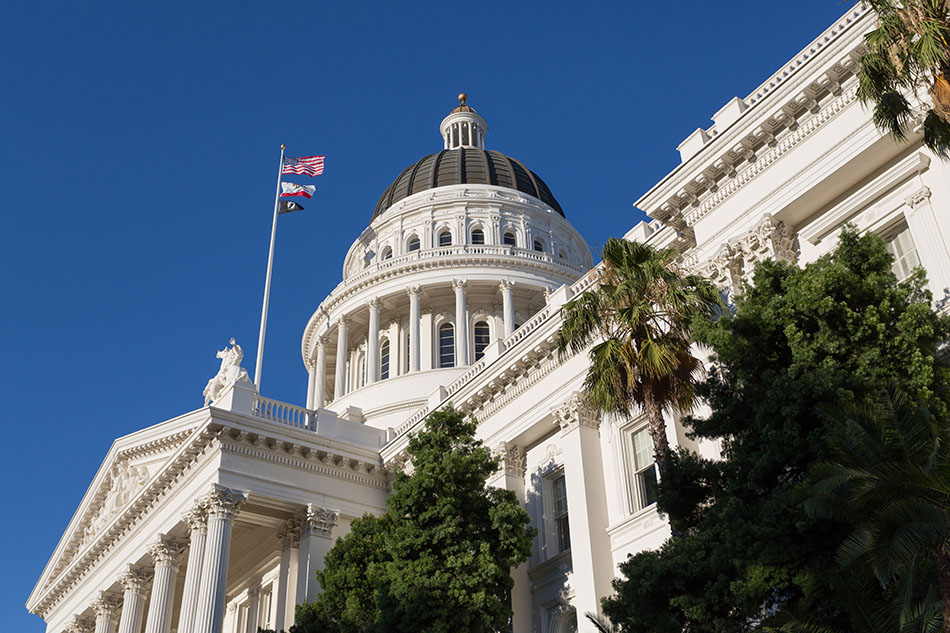
Calif. legislators have heard from a cadre of industry groups recently. | ZikG/Shutterstock
As a plastic packaging reduction bill moves forward in California, an industry group is recommending a per-item fee to fund recycling efforts.
The American Chemistry Council (ACC) this month proposed a fee on a variety of single-use food-service packaging materials sold in California. The generated money would be earmarked for waste reduction and recycling projects.
The proposal came during legislative work on AB 1080 (SB 54), a packaging reduction bill that has gained traction this year. The bill mandates a phased-in recyclability requirement for certain single-use plastic products, but the way in which that requirement is met would be left up to state regulators, a fact that has worried some industry groups.
ACC has expressed concern with the bill delegating broad authority to the California Department of Resources Recycling and Recovery (CalRecycle) to develop regulations for how the mandated goals will be reached.
That authority could allow the department to “pick and choose winners and losers in the marketplace,” said Tim Shestek, senior director of state affairs at ACC, during a July 3 hearing on the bill. The association also wants more flexibility in the bill’s requirements.
ACC came to the hearing with “comprehensive amendments” and the fee proposal, which could be one component of increasing the recycling rate to meet the bill’s requirements. The group is suggesting an advanced recycling fee that would cover not only single-use plastic food packaging most often associated with marine debris but also non-plastic foodservice packaging.
During the July 3 hearing, Shestek said the industry association feels the proposed fee “would be a significant contributor toward helping finance some of the necessary infrastructure improvements, improvements to litter abatement, public education, assistance to local governments.”
Shestek briefly mentioned the proposal during the hearing, and Plastics News this week provided more detail, reporting that it would be a “3/10ths of a penny fee per item on single-use food service packaging, paid somewhere along the manufacturing or distribution supply chain.” The fee would raise nearly $100 million per year, Plastics News wrote.
“We think it’s a good way to get to the objective that we’re trying to achieve in a reasonable and realistic fashion,” he said.
A cadre of industry groups also expressed opposition to the bill as written, including the Plastics Industry Association, the American Institute for Packaging and the Environment (AMERIPEN) and others.
The legislation passed out of the Senate Environmental Quality committee after a hearing on July 3 and will be sent to the Senate Appropriations Committee. AB 1080 previously passed a floor vote in the state Assembly, and its companion, SB 54, passed a floor vote in the Senate.
“We’re not trying to be too prescriptive,” said state Sen. Ben Allen, a Democrat who co-sponsored the bill, during the July 3 hearing. “We’re trying to tell our agency, CalRecycle, to work very closely with industry, with cities, with waste management folks and haulers, to figure out a strategy to reduce single-use plastic waste.”
That doesn’t mean getting rid of single-use plastics, he noted, describing the bill as a way of making existing packaging more sustainable. Furthermore, the “recyclability” push outlined in the bill doesn’t mean technically recyclable, but that it could actually be recycled in programs around California. The bill requires single-use plastic packaging and certain other single-use plastic products reach 20% recycling rates by 2024, 40% by 2028 and 75% by 2030.
The bill received support at the July 3 hearing from numerous environmental organizations, local governments and hauler and MRF operator Recology.
The fee proposal and other amendments will be discussed during the one-month legislative recess that begins July 12.
In other California legislative news
- Recycled content mandate: A bill requiring plastic beverage container manufacturers to use an increasing percentage of recycled plastic over the coming decade passed the state Assembly, recently moved out of the Senate Environmental Quality committee and will go to the Senate Appropriations Committee. The mandate has been modified from an earlier version to be more lenient. Previously, the mandate required 25% recycled plastic use in applicable containers (those covered by the state’s container redemption program) by 2021, 50% by 2025, 75% by 2030 and 100% by 2035. Currently, it calls for 15% by 2021, 25% by 2023, 35% by 2025, 50% by 2027 and 75% by 2030.
- Basel amendment: The state Senate this month approved a resolution supporting the Basel Convention amendment that was adopted earlier this year. The resolution urges federal lawmakers to ratify the Convention (the U.S. is among a small minority of countries worldwide that have not done so). The resolution explains that “the State of California will be better able to meet its waste reduction and recycling goals if the United States joins the 187 nations that are party to the ongoing efforts to reduce and monitor global wastes, increase the use of recycled materials from waste materials, and protect less-developed countries from exploitation, as outlined in the Basel Convention, rather than being subject to a patchwork of existing individual agreements and the possible need for additional agreements with other nations in the future.”
- Carpet stewardship: A bill changing the state’s carpet stewardship program advanced out of the Senate Environmental Quality committee this month. AB 729, which previously passed a floor vote in the state Assembly, requires “the funding mechanism to be composed of a system of differential assessments that takes into account the financial burden that a particular carpet material has on the stewardship program,” according to analysis from the Senate Judiciary Committee. According to the document, the bill has received support from environmental organizations and local governments and opposition from business interests and the carpet industry.
More stories about legislation
- California lawmakers look to quantify PCR imports
- NY legislative session ends, again without EPR
- Both coasts see DRS program changes



